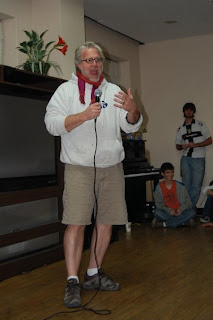At least that's what is often said about the subject of either religion or politics, especially as we anticipate conversations with family and friends at holiday gatherings. Earlier this semester, though, I came upon a book whose author dares to take on both and does so in an thought-provoking way.
This topic is one that continues to interest me as I examine the inter-relationship of law, ethics and theology. So, since I recently completed (teaching is not the only thing I've been doing here at Handong these past four months) the following review of this new book by Richard Hughes -- a professor from whose writings I have learned much -- I thought some of you might enjoy or even be challenged by his throughts on:
Christian America and the Kingdom of God (
University of Illinois Press, 2009)
No subject raises more debates nor fosters greater confusion among conscientious Christians than the inter-relationship of religion and politics. Professor Hughes’ new work contributes significantly to this on-going debate by both helping to dispel the confusion over history and the Bible that all too often characterizes those discussions and charting a clearer course for a Christian’s engagement of the political and social issues of our day.
Through careful historical analysis and comprehensive biblical exegesis, Hughes examines not only whether America was ever intended by its founders to be a Christian nation but also what is an even more telling inquiry; namely, whether that description may, or even should, be applied to the United States today. His approach to these questions, though, goes well beyond mere political theory or even theological doctrine. Indeed, Hughes has accomplished in this concise work as comprehensive a critique of “Christian Americanism” as Mark Noll did of anti-intellectualism fifteen years ago in his
Scandal of the Evangelical Mind.
From the outset, Hughes asserts three theses: first, “the notion of Christian America and the notion of the kingdom of God are polar opposites whose values could not be further apart” (4); second, “the devastatingly ironic truth that Christian America so often behaves in such unchristian and even anti-Christian ways” (5); and finally, “that Christians should behave in ways that are consistent with their profession of faith, especially in America’s public square” (5). He then proceeds to present his case against Christian Americanism in five well-formed chapters.
In the first, he examines the historical account of those who have viewed America as a nation chosen by God. Beginning with the earliest identifications made by colonial leaders of the New World as a “Promised Land,” Hughes surveys a litany of claims to America’s “chosen” status throughout its history. He describes each assertion fairly and within both the historical and theological contexts that gave them rise. Having succinctly and carefully observed claims from Tyndale’s time to their contemporary formulations in the preaching of D. James Kennedy, Hughes proceeds to assess whether such claims hold up under the scrutiny of a thorough biblical review.
Many who advocate for America’s chosen status draw heavily upon analogies to the nation of Israel in the Old Testament. But rather than indulging in a “proof-text” approach, Hughes counters these claims by charting the full scope of the Biblical narrative to demonstrate that the particularistic status associated with Israel as God’s chosen nation in the Hebrew Bible finds its fulfillment, according to the New Testament, not in a national – much less an ethnically identified – community, but in the Body of Christ, in whom there are no racial, national, ethnic, political, nor even social or economic distinctions.
In his next two chapters, Hughes turns his analysis from the notion of America as a “chosen nation” to the theme which occupies him for the larger part of this work, i.e. a biblical understanding of the kingdom of God and its bearing upon the claim of a Christian America. His critique is premised upon the notion that if America is to be considered a truly Christian country, then it values and actions should bear semblance to the description of the qualities and characteristics that define the kingdom of God both in the Hebrew Bible (in particular the those announced and called for by the prophets, e.g. Isaiah, Jeremiah, Hosea, Amos and others) and in the teachings of Jesus Christ and his apostles as set forth in the New Testament. Hughes demonstrates that the chief characteristics of the kingdom of God described in the Scriptures taken as a whole are justice and peace.
Justice, especially as called for by the prophets, means equitable treatment and care especially for the poor and marginalized in society. Peace entails a conscientious dedication to peace-making and efforts toward reconciliation between individuals, groups and races as well as nations. Though Hughes does not cite him in depicting a nation devoted to peace, echoes can be heard of Bonhoeffer’s Fano address: “There is no way to peace along the way of safety. For peace must be dared. It is the great venture” (
A Testament to Freedom, 228). Hughes’ analysis of the New Testament passages on the kingdom of God, though sound in both interpretation and application, could have been rendered even more persuasive among a broader scope of evangelicals and fundamentalists (all of whom should be reading this book) had he relied upon the scholarship of N.T. Wright on several points where he instead resorts to Crossan.
In the remaining chapters, Hughes returns to an historical investigation of reasons offered to support Christian Americanism. He traces the first antecedents of this idea all the way back to Constantine’s Edit of Milan and then charts its seminal development through Justinian and Theodosius. He describes a second strand in its emergence that was woven in through the Reformation and especially Calvin’s doctrine of the sovereignty of God that motivated a not insignificant number of the early colonists. Hughes strongly rejects, however, the claim that the new nation was established as a distinctively Christian country.
Rather, he demonstrates instead that the vast majority of the founding leaders were not exclusively Christian and that the documents they formulated to define the nation, while upholding the role of religion in society and protecting it from state interference, were in purpose and effect fundamentally secular. He then recounts a series of engagements throughout the 18th and 19th centuries in an on-going battle for Christian America through such forays as the Second Great Awakening and Manifest Destiny, then on to the Gilded Age’s gospel of wealth and the social gospel’s rejection of it. All of which, Hughes contends contributed in various ways to the messianic nationalism that characterized those who advanced Christian Americanism through the later part of the 20th century and into our present day.
The book reaches its climax in Hughes unflinching critique of the fundamentalist vision of America within a Dispensational eschatology as it was embodied within the Evangelical Right from its early advances in the Reagan administration to the political might it displayed through the policies, both foreign and domestic, of George W. Bush. In sum, he issues a prophetic warning, in his own right, to all those who claim that God is on “their side” in an Armageddon-like clash of civilizations. Hughes concludes his critique by drawing a telling analogy:
"Obviously, there is a sense—and, in fact, a profound sense—in which America is a Christian nation. After all, some 76 percent of the American people claim to be Christian in one form or another. But the Christian character of the United States is comparable to the Christian character of the Roman Empire after Constantine . . . . Like that ancient empire, the United States abounds in Christian trappings. And yet the United States embraces virtually all the values that have been common to empires for centuries on end. It pays lip service to peace but thrives on violence, exalts the rich over the poor, prefers power to humility, places vengeance above forgiveness, extravagance above modesty, and luxury above simplicity. In a word, it rejects the values of Jesus" (185-86).
In this book, Hughes has synthesized and fortified the calls issued over the past ten years by the likes of Stephen Carter and Jim Wallis for a renewed prophetic engagement of religiously motivated Christians in the social and political issues of our day; but in so doing, to acknowledge that the Kingdom of God will not, indeed cannot, be brought about by force of arms or even force of law, but as it was, and is and will be in Christ’s day, only by the force of truth. For anyone who wishes to live responsibly within the concrete realities of life today, Hughes’ analysis found within these pages should be read with careful thought and his challenges heeded with conscientious action.

























